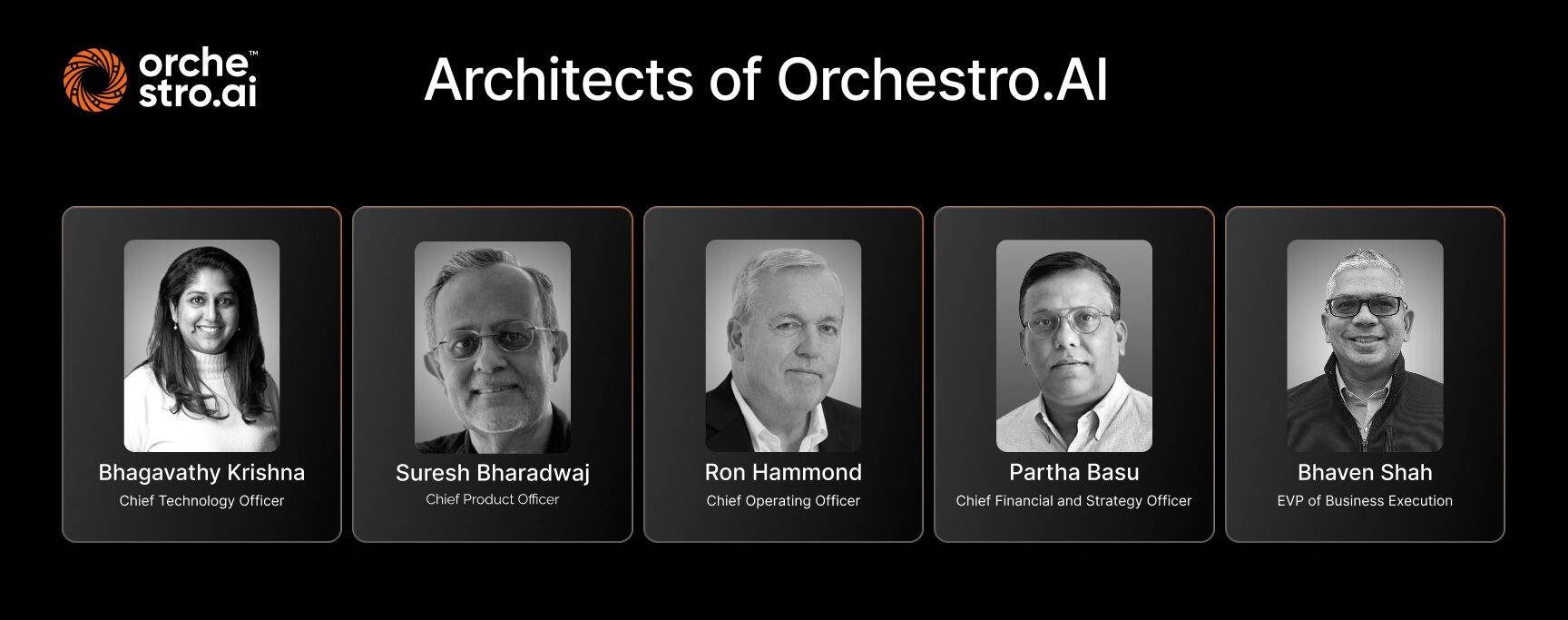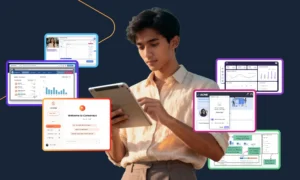We didn’t walk away from everything just to build another tech company. We left to reimagine the infrastructure of global trade. To challenge legacy systems that move trillions of dollars worth of goods, yet operate like patchwork quilts in a real-time world.
At Orchestro.AI, we are the architects of a new era—designers of a logistics brain that sees, learns, and acts. A system that doesn’t just move packages, but understands the flow of commerce with the intelligence of an internet-native platform.
This is more than a startup. It’s a movement.
Meet the Minds Behind the Movement
We come from frontline operations, cutting-edge AI labs, and hard-earned battle scars in global supply chains. What unites us is a shared frustration with broken systems and a bold vision for what could be. We are building the self-orchestrating foundation of logistics—a world where decisions are instant, systems speak fluently, and trade flows as naturally as information.
Bhagavathy Krishna
- “What moment made you realize you had to build Orchestro—even if it meant walking away from everything else?”
“I’ve been part of Orchestro since day zero—this journey began with Shekar back in the AEO days. We’ve inspired and pushed each other through the highs and lows. That’s what founding teams do: they hold each other up when the mission demands everything.
Over the years, we’ve seen the access barriers that small shippers, carriers, and innovators face every single day in the supply chain world. It’s a landscape riddled with inequity—designed for scale, not fairness. And from those AEO days, we also learned what not to do. Those lessons shaped the foundation of Orchestro.
The world has built what we call “Stackware”—a chaotic maze of siloed choices, bloated systems, and duct-taped integrations. We’re building something else entirely: interoperable, intelligent networks that actually work for humans. We’re creating a brand-new category—one that didn’t exist before. Orchestro is the world’s first Logistics AI platform with 99.8% accuracy. That’s not an iteration. That’s a breakthrough.
But truthfully, this obsession with solving massive, systemic problems has always driven me—whether at St. Jude or Apple. When you believe in the mission deeply enough, it’s easy to walk away from FAANG, from stability, from predictability. I didn’t hesitate. Because this isn’t just a job—it’s the purpose of my life. We believe in what we’re building. That’s what makes it easy.”
- “What’s one invisible problem in logistics or delivery that keeps you up at night—and how are you solving it in a way no one else is?”
“One of the biggest invisible problems in logistics isn’t a broken truck or a missed SLA—it’s that the systems meant to fix those things don’t speak human. They’re black boxes. They drown operators, dispatchers, small businesses in complexity they didn’t ask for. And in the AI era, that risk has only grown.
That keeps me up at night—not the complexity, but the lack of clarity. The lack of explainability. Because if AI makes a routing decision, or a contract risk prediction, and you can’t explain it to the person whose business or livelihood is affected by it, then you’ve built a machine that commands people instead of serving them.
At Orchestro, we flipped that model. Our AI doesn’t just work—it shows its work. Every prediction, every optimization, every decision it recommends is backed by traceable logic, accessible to a human operator. It’s designed to make the frontline smarter, not obsolete.
That’s what sets us apart. We’re not building magic. We’re building muscle memory for the supply chain—rooted in human judgment, scaled by AI, and governed by radical transparency. And that’s what makes it responsible.”
- “If Orchestro succeeds in 10 years, what does the world look like—and what will you be most proud of changing?”
“If Orchestro succeeds the way we intend it to, the world will feel smaller, fairer, and more human. We’ll have touched every corner of the planet—empowering a small shop owner in Nairobi, a truck driver in Texas, or a supply chain manager in Manila—with tools that give them clarity, agency, and dignity.
And that’s what I’d be most proud of: that we didn’t just optimize logistics, we enhanced people’s lives. We didn’t just build AI for the Fortune 500—we built AI that listens, explains, and serves the everyday heroes in the supply chain.
Shekar and I both have 5-year-olds. Everything we’re doing is with them in mind. We want to leave behind a world they can not only live in, but cherish—a world where intelligence is shared, not hoarded; where opportunity is orchestrated, not restricted. That’s the world we’re building with Orchestro.”
Suresh Bharadwaj:
- “What moment made you realize you had to build Orchestro—even if it meant walking away from everything else?”
Orchestro’s vision was to transform parcel logistics by driving efficiency, eliminating waste and create a sustainable world. I also saw this as an opportunity to make it a phenomenal growth story related to strides in ecommerce making it compelling for me not to miss it.
- “What’s one invisible problem in logistics or delivery that keeps you up at night—and how are you solving it in a way no one else is?”
An often overlooked fact is that enterprise systems continue to perpetuate operating silos in a world that’s never been more networked and open than it is right now. Ability to seamlessly build and operate a partner network is not just a business imperative but what our customers’ customers expect. What we are enabling at Orchestro is a platform that goes beyond just integrating various systems to driving inter-operability across partners all the while protecting their existing technology investments. Such a vision is fully grounded in operating from a single version of truth of data enabled by artificial intelligence and automation.
- “If Orchestro succeeds in 10 years, what does the world look like—and what will you be most proud of changing?”
What I envision is democratization of technology access enabling small businesses to both collaborate and compete with large corporations on a much more level playing field. What I see is for corporate users to enjoy the same experience that they themselves have as consumers outside their work environment. It would be a world where common people feel empowered to use technology through natural language interactions and help themselves and serve others in the most efficient and effective way possible.
Ron Hammond:
- “What moment made you realize you had to build Orchestro—even if it meant walking away from everything else?”
Shekar’s vision is brilliant and compelling. When I heard it I knew I had to be part of it. If delivered upon, it will transform how supply chains function, eliminating vast amounts of wasted effort and time. Doing more with less (resources), better & faster by eliminating this waste ultimately benefits all of humanity.
- “What’s one invisible problem in logistics or delivery that keeps you up at night—and how are you solving it in a way no one else is?”
All of the information we need to make supply chains run seamlessly and efficiently can be known, as is known somewhere. Siloed, unconnected systems that lack the capacity to see all that could be seen and know all that could be known hamper supply chain effectiveness. Orchestro is solving this by creating a neutral platform that allows interoperability between participants and using an army of specialized AI agents in an ever learning environment that will unleash capacity and create efficiencies that have heretofore been unattainable.
- “If Orchestro succeeds in 10 years, what does the world look like—and what will you be most proud of changing?”
Ten years from now I see a world that has built off the Orchestro model where data accumulation and AI agents have been used to work with humanity versus instead of humanity making lives better and more fulfilling. The vast majority of this benefit would accrue to the under served that suffer the most when supply chains fail.
Partha Basu
- “What moment made you realize you had to build Orchestro—even if it meant walking away from everything else?”
The opportunity to build something new, from the grounds up, which has the potential to destabilize the existing logistics marketplace is a once-in-a-lifetime opportunity. And when the opportunity exists within a team filled with subject matter experts you can relate to and a leader you believe in, then you never let the opportunity pass. So, when Shekar reached out with his ask to join his team, it was an easy answer. The opportunity to contribute to a purpose-driven organization looking to empower small businesses is worth it.
- “What’s one invisible problem in logistics or delivery that keeps you up at night—and how are you solving it in a way no one else is?”
Sub optimum routing networks and incomplete knowledge of the potential demand and supply options create inefficient shipping solutions on a regular basis in the marketplace. The inability to describe, define, and harness all these data elements that are driving sub-optimization of enterprise network models creates revenue and business opportunities. Our fervent endeavor is to build up this comprehensive data model within Orchestro that will allow companies, especially small business enterprises, to avail themselves of the cheapest and most efficient logistics solutions for their businesses.
- “If Orchestro succeeds in 10 years, what does the world look like—and what will you be most proud of changing?”
If Orchestro succeeds, sub-optimized shipping networks would be a thing of the past. Businesses would not have to worry about imperfect knowledge of freight rates or routing solutions. Shipping contracts would all be digitalized. New businesses, especially small and entrepreneurial businesses in trucking and routing solutions will evolve and data availability and data knowledge would not be a barrier to entry. Logistics will be redefined with data and AI solutions becoming the source of truth and Orchestro, will be a true change agent leading this change. That will be what will make all of us proud!
Bhaven Shah:
- “What moment made you realize you had to build Orchestro—even if it meant walking away from everything else?”
The pivotal moment came shortly after I exited my EdTech startup, which had been acquired by a billion-dollar enterprise. While I was naturally gravitating toward another education venture, my conversation with Shekar changed everything.
What struck me wasn’t just Shekar’s vision for transforming the logistics industry—a space I knew well from my first venture that was later acquired—but how he framed it as a mission to restore balance to an ecosystem that desperately needed it. His passion for helping underserved segments resonated deeply with me, especially the sustainability angle that would create meaningful impact beyond business metrics.
What ultimately convinced me was Shekar’s infrastructure-first approach to building a truly scalable solution. Having previously experienced the limitations of building on shaky foundations; I recognized this rare opportunity to “build it right” from the ground up. The central role AI would play aligned perfectly with my personal mission of creating responsible AI systems that genuinely benefit society rather than just optimize for profit.
In that moment, I knew this wasn’t just another business opportunity—it was the chance to build something transformative that embodied both our values and vision for technology’s role in creating a more equitable world.
- “What’s one invisible problem in logistics or delivery that keeps you up at night—and how are you solving it in a way no one else is?”
The invisible crisis in logistics isn’t merely inefficiency—it’s the systemic fragmentation causing billions in waste across a multi-trillion dollar industry. Despite technological advances, we’re still watching shipments sit idle for days because Company A’s system can’t communicate with Company B’s platform, while Company C’s AI makes decisions with incomplete information.
At Orchestro, we’re tackling this differently by building what I call “connective tissue” for the entire ecosystem. While others are creating point solutions that actually worsen fragmentation, we’ve developed a proprietary vertical AI knowledge model that understands logistics contexts across different players and systems. This foundation powers our self-optimizing agents that can work across organizational boundaries, using our normalized labeling system to ensure everyone—from truckers to warehouses to last-mile delivery—speaks the same digital language.
The breakthrough is our universal ecosystem interoperability layer that doesn’t require everyone to abandon their existing systems. Instead, it transforms Orchestro into a neural network for global logistics, where each connection makes the entire system smarter and more efficient.
- “If Orchestro succeeds in 10 years, what does the world look like—and what will you be most proud of changing?”
In a decade, we’ll have transformed logistics from a reactive industry plagued by disruptions into a predictive ecosystem that anticipates problems before they emerge. Imagine global supply chains that self-heal during natural disasters, automatically rerouting critical supplies while calculating the lowest environmental impact—not as a premium feature, but as the standard operating model.
What excites me most is the democratization of logistics optimization. Instead of the current winner-takes-all model, we’ll see a renaissance of regional businesses thriving alongside global players in a more balanced ecosystem.
I’ll be most proud of building what we internally call the “autonomic nervous system” for global supply chain —a self-optimizing network that continuously balances efficiency, environmental impact, and economic opportunity without requiring constant human intervention.



































